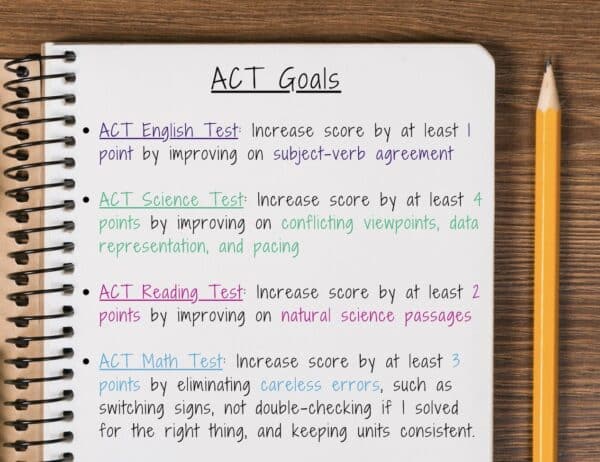


Are you trying to figure out how to improve your ACT score by 10 points? Good news—it’s definitely in your future if you’re willing to work for it! And honestly, it doesn’t take as much effort as you might think it does. As long as you are consistent and focused and you study strategically, you will see major improvements in your ACT score.
Whether you’re in the middle of your ACT prep right now or have already taken the test, this post will provide you with the tips and concrete tools that will help you stay focused, be strategic, and reach that score goal!
Check out our table of contents for a preview of each tip and click the links to learn more!
Planning might be boring for most students, but in order to improve your ACT score by a significant margin like 10 points, you need to have the right plan. While you definitely shouldn’t spend too long on planning, following the tips below will help you create the right foundation to get the most out of your ACT prep.
The first thing to understand is that the path to a 10-point increase on the ACT does not look the same for everybody. In terms of the time and energy required, going from a 19 to 29 is not the same as going from a 26 to 36.
A general rule of thumb is test-takers scoring at a 26 or above have a pretty good grasp of the content; the focus here would be improving pacing, maybe getting more comfortable with some question types, and avoiding careless errors. Test-takers scoring below that threshold likely need to focus on mastering content and then pacing.
If you’re scoring below 26, improving your ACT score by a significant margin might require a somewhat heavier lift than for someone with a higher initial score.
That being said, high scorers shouldn’t celebrate just yet. It can be easy to plateau and stay at the same score no matter how much practice you put in. Because of the way ACT scoring works, students who mainly need to focus on content mastery will typically see quicker gains in points than those who are generally familiar with the content.
Now that you have a broad sense of how to improve your ACT score, it’s critical to get a detailed understanding of both your weaknesses AND your strengths. It would be helpful to know the makeup of the ACT inside and out, if you aren’t too familiar already, starting with the sections you need to improve the most on. Consider answering the following questions:
If you already took the ACT, your ACT Score Report provides you with an easy way to see the breakdown of each subject area and understand how to improve your ACT score. If you just took the ACT, you should drop everything you’re doing and see if you’re eligible to take advantage of the ACT’s Test Information Release, which gives you the entire test, your answers, and the answer key. Reviewing how you did on each question will provide you with a goldmine of information about how you do on test day. (We cover best practices for reviewing ACT questions in this section below).
![]()
You might be wondering how many hours it takes to improve your ACT score by 10 points. Although it’s possible to improve your ACT score in a week, achieving a 10-point increase requires a much longer timeline.
You should give yourself a minimum of 6 weeks to prep before you take/retake the ACT. If you don’t have that much time, try to spend at least 30 hours between now and test day in order to see significant improvements to your ACT score.
Our collection of ACT study schedules can help you craft a study plan that best fits your needs. If you’re really strapped for time, you can check out our quick ACT prep schedule, which will help you maximize study efforts in just 20 minutes a day. But if you truly want to see a big increase in your ACT score, it is highly encouraged that you model your ACT plan after one of our longer study schedules.
Once you have determined how long you have to prep, figure out which sections and specific topic areas will be your priorities. A lot of factors could go into determining this.
Say, for example, that you’re scoring a 32 on Math and a 25 on Reading. For most students, it would make sense to prioritize improving their Reading score over their Math score. If, however, you’re applying to a math-intensive program and your Reading score is close to the average scores of admitted students, it might make sense to prioritize getting a perfect score on Math before improving your Reading.
Do some research on your top choices to help you figure out target score ranges for each section and use that to structure the content of your ACT study sessions.
In fact, if you have already achieved your target score on certain sections, the ACT has some great news for you! Starting in September 2020, students will have the opportunity to retake particular sections rather than the entire test. This policy change is huge for reducing stress, saving study time, and maximizing the impact of your prep.
But make sure that taking advantage of this policy would be in your best interest (this is where school research comes handy). Most programs like to see consistent scores across subjects; if you have some scores that are noticeably higher than others, admissions officers could mark that as a weakness.
If you don’t take advantage of this new policy, it’s important to not completely neglect the sections that you are stronger on as you determine how to divide your study time. By focusing only on weaker sections, there is a high chance that you will improve on these sections while scoring lower on your stronger sections.

The best way to prioritize your study time is to create measurable goals for each section you’ll retake. Use your composite score goal to figure out how many additional points you need in each section.
Then, translate that to the skills and topics you need to master to reach each subscore goal. Use your analysis of your strengths and weaknesses to identify the most-tested topic(s) or test-taking skills that you still need to master in each section. The following guides will help you create these specific goals:
And as a bonus, if you’re also looking to improve your writing skills for the optional Writing section:
Below is an example of goals written by a hypothetical student retaking all sections (notice the specificity):
 and keeping units consistent. -image by Magoosh" width="600" height="462" />
and keeping units consistent. -image by Magoosh" width="600" height="462" />
And once you achieve your initial goals, create new ones (then rinse and repeat)! Work your way up to mastering the least common (and often most difficult) content on the ACT, and you’ll see that hard work pay off in the form of increases in your ACT score.
![]()
So imagine this scenario: you’ve identified all your strengths and weaknesses. You’ve analyzed the ACT and come up with a detailed plan to improve your ACT score. You sit down to start your prep and then…you realize that spending two hours on TikTok sounds much more appealing, so you do that instead.
Sounds plausible, right? Procrastination is natural and a very real threat to improving your ACT score. That’s why it’s critical to realize early on that all your ACT planning and preparation would be for nothing if you are not guided by a deep understanding of what motivates you to actually study.
Maybe internal motivation is what drives you and creating a study space with pictures of your dream school, for example, or reminders of your future ambitions would be enough to keep you focused. Or perhaps you need external motivators; in that case, you should consider asking your family for perks (I can attest that this worked for me!), getting a tutor, or finding a study buddy.
You know yourself the best, so whatever motivates you—and you can find more examples in our collection of perfect ACT score stories—needs to be built into your ACT prep from the get-go.
Whether or not you need external motivation, there are several reasons why you should consider prepping with a buddy or a group, at least for a portion of your study plan. Here are four of them:
If you’re concerned about friends being too distracting, don’t be afraid to be selective about whom to study with. Think about people who are serious about the ACT and who have complementary skills to you, meaning that you all would gain something by learning from each other. And if you’re still skeptical about the benefits of group study, there’s nothing to lose by just trying it out!
![]()
You can spend hundreds of hours on ACT prep, but if the materials are of poor quality, all that effort will be wasted. Take a moment to evaluate whether it is worthwhile to continue using the prep that you have used or are currently using. If you have experience with tutoring or a prep course, did you find it effective? Does your prep book have good reviews across the board? If you have been using free online materials, did you verify that they’re the best free prep out there?
In addition to ensuring that you have access to high-quality ACT prep, you want to make sure that the materials are well-suited for both your learning style and your wallet. If you think tutoring or ACT prep courses are too pricey but you’ll benefit from interactive lessons and one-on-one support, you should check out Magoosh ACT prep, which is a fraction of the cost of traditional test prep options. Another added benefit of Magoosh is that it automatically tracks your strengths and weaknesses and helps you prioritize your studying so that you don’t have to. (And if Magoosh ACT prep is still too expensive, you should see if your school or community center is able to get it for you.)
Regardless of the type of prep you choose, make sure that you don’t spread yourself too thin across too many options; finish the practice content provided by your primary resource before moving on to others. But do make sure that your prep includes some quality full-length practice ACTs taken under test-like conditions.
![]()
Once you plan your ACT prep and gather quality test prep materials, here are four tips and tools to help you reach your 10-point goal.
This is probably the most important thing you can do to improve your ACT score. Seriously, if there is only one thing you take away from this post, it should be this: Every time you complete an ACT question, whether on a practice test, a quiz, or after a lesson, you need to make sure you understand it 100%.
The way to beat standardized tests like the ACT is to become very familiar with how they ask questions. There’s no way to do this other than absorbing as many questions as possible.
If you’re taking practice tests, first make sure to answer every question before checking your answers. Don’t worry about time limits—just focus on getting the right answer.
Then, review ALL questions: the ones you got wrong and the ones you got right. Sometimes, you may get the right answer on a fluke, so it’s always good to double back and make sure you understand what the question was asking and how to get to the right answer. But if you need to prioritize while reviewing, focus on the questions you got wrong.
Now, do the following for each question you didn’t understand and you answered incorrectly:
1. Don’t look at the answer explanation right away. Start with the correct answer and reason through the question again before looking at the explanation to check your logic.
This process reveals in a much more hands-on way mistakes you may have been making, faulty reasoning you may have been using, or even knowledge that you may have had buried inside that was only able to come out on the second go.
Compared to just passively reading the answer, actively re-engaging with the question helps you better internalize how to avoid careless mistakes, faulty reasoning, and lapses in knowledge for similar questions in the future. Think of it as building muscle memory!
2. Make sure to keep track of these questions in an error log, in which you note the question, the right answer, and why you got the question wrong.
For your convenience, we have created an error log tool for you here, which you can copy into your Google Drive or use as a model if you prefer to create your own digital or paper-based error log.
Having a digital tool like this can help you easily keep track of patterns in the types of questions you’re getting wrong and the errors you’ve been making as well as determine the strategies that will help you the most in a given section. (If you have any questions about this tool or notice any bugs, please let us know in the comments below!)
![]()
ACT pacing is about making the most out of the full amount of time you have to complete the ACT.
If you find that you have extra time left over at the end of each section, slow down. Double-check answers for questions you were a little unsure about. Although the ACT is timed, it is not a race.
Alternately, if you find that you have no time left at the end of a particular section and there are still questions left unanswered, you should take timed practice sections until you’re familiar with the pacing. To answer every single question, you have:
As you can see, there is no time to waste. If you find yourself struggling with a question, make a guess, mark the question, and move on. You can come back to it later if you have time, but you don’t want to leave anything blank as the ACT doesn’t penalize you for wrong answers. You’ll want to become best friends with the timer, which will not only keep you within the time limit but will also help you schedule much-needed breaks.
For more tips on how to maximize your time on the ACT, make sure to check out our Complete Guide to ACT Pacing and Time Management and refer back to the guides linked in this section. These resources are full of time-saving strategies for each section, such as improving your mental math or using the answer choices to backsolve for the ACT Math section, ACT Science tips like “predict before you peek,” and general tips on how to actively yet efficiently read passages.
![]()
I said it once and I’ll say it again: you can’t expect to raise your ACT score by 10 points in one week. Cramming, or last-minute studying, is not a substitute for dedicated, long term studying. Your brain needs time and practice to form new connections and gain new knowledge. There are no quick hacks for getting smarter!
If you’re already strapped for time, the onus is on you to be as smart as possible about how you use your ACT prep time. Consider every minute as precious. If you find yourself procrastinating, remember your motivations! Here are some tips to help you maximize your study time:
![]()
Remember: the ACT is just one aspect of your college application, and you likely have other things to focus on alongside your ACT prep, like your GPA and extracurriculars. While we recommend sticking to the above tips as much as possible, don’t stress if you’re not able to follow these tips to their fullest extent.
Do not, under any circumstances, neglect your mental and physical health. Healthy eating, exercising, and managing stress aren’t just good life choices—they’re scientifically proven to help improve test scores! Getting a good night’s sleep is particularly important. Sleep is when your brain replays the patterns that it has learned during the day. It is crucial that you don’t skimp on sleep if you want to remember what you have learned.
For more information on how mental and physical health can help you improve your ACT score, click the image below to check out our Exam Lifehacks infographic!

Click here for a transcript of the infographic
Try out these simple tips and tricks to give yourself an edge on test day. When added to good, old fashioned studying, this advice can boost your confidence and help you achieve a higher score. Good luck and happy studying, from Magoosh!
How much time do you have left before the big test?
If you have one month left:
If you have one day left:
During the test:
Click here return to the top of the transcript.
Does the thought of taking the ACT just make you feel so nervous that it’s difficult for you to concentrate? If so, you’re definitely not alone. Here are some tips to ensure that you’re in control of the ACT rather than letting the ACT control you!
Do not focus on the score. This might sound counter to the whole point of the post, but if test anxiety is really threatening your success on the ACT, just forget about your score goals entirely. For example, instead of saying:
Increase ACT Science score by at least 4 points by improving on conflicting viewpoints and data representation questions.
…you can reframe the goal simply as:
Improve on conflicting viewpoints and data representation questions on ACT Science.
If you just push yourself to master as much ACT content and skills as possible, you’ll see significant gains in your test score without even realizing it!
Take deep breaths. Whenever you start to feel anxious, take a few deep breaths and remember that the ACT is testing you on things you already know. You’ll instantly feel calmer! We cover deep breathing in more detail in the above infographic.
Health comes first. I said this already but another reminder doesn’t hurt. 🙂 If you don’t have the best sleep habits, at the very least prioritize sleep for a few days leading up to the exam and not just the night before the exam. Otherwise, your sleep deficit will definitely hurt you on the day of the test.
Be organized for test day. Test day is nerve-wracking as it is; you don’t need to make it worse with the nagging sensation that you might be forgetting something. Check out our article on ACT tips for test day so that you know what to expect and bookmark it so that you have it handy closer to the real ACT test.
Start following the tips in this article today! The single most effective way to beat test anxiety is preparation. If you know what will be tested, you probably won’t be as nervous. Use these tips to learn everything you can about the ACT and what will be on it as well as create and implement a personalized plan to kick some ACT butt!
![]()
So there you have it, our top tips for how to improve your ACT score by 10 points! The preparation will not be easy, but it is definitely achievable if you follow these tips.
Ultimately, all of these tips boil down to three principles: get in the right mindset, study smart, and take care of yourself. As long as you focus and follow ALL three of these principles to the best of your ability, you’ll not only see your ACT score go up, but you’ll also be a lot happier throughout this process than if you didn’t.
Best of luck and remember that Magoosh is here for you! If you have any questions at all during your prep, just comment below!
As one of Magoosh’s Blog Editors, Anika relies on her nearly 20 years in education and youth leadership spaces to produce empowering, student-centered content across Magoosh’s blogs. Anika has a BA from Grinnell College and an MPP from Harvard University. Her experience includes serving two years as a Fulbright English Teaching Assistant in Malaysia, an SAT tutor for Kaplan, and currently, as the Executive Director of Youth Activism Project, a nonprofit that she co-founded when she was 12 years old. Anika’s work has been featured in The Washington Post, The Boston Globe, and Yahoo! Money. She has also spoken at panels and given presentations at New York University and Harvard University. If you’d like to keep up with Anika, you can check out her LinkedIn, Instagram, Twitter, and personal website. View all posts